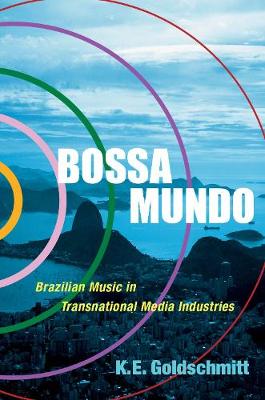Currents in Latin American and Iberian Music
1 total work
Brazilian music has been central to Brazil's national brand in the U.S. and U.K. since the early-1960s. From bossa nova in 1960s jazz and film, through the 1970s fusion and funk scenes, the world music boom of the late 1980s and the bossa nova remix revival at the turn of the millennium, and on to Brazilian musical distribution and branding in the streaming music era, Bossa Mundo: Brazilian Music in Transnational Media Industries focuses on watershed moments
of musical breakthrough, exploring what the music may have represented in a particular historical moment alongside its deeper cultural impact.
Through a discussion of the political meaning of mass-mediated music, author K. E. Goldschmitt argues for a shift in scholarly focus-from viewing music as simply a representation of Otherness to taking into account the broader media environment where listeners and intermediaries often have conflicting priorities. Goldschmitt demonstrates that the mediation of Brazilian music in an increasingly crowded transnational marketplace has lasting consequences for the creative output celebrated by
Brazil.
Like other culturally rich countries in Latin America-such as Cuba, Mexico, and Argentina-Brazil has captured the imagination of people in many parts of the world through its music, driving tourism and international financial investment, while increasing the country's prominence on the world stage Nevertheless, stereotypes of Brazilian music persist, especially those that valorize racial difference. Featuring interviews with key figures in the transnational circulation of Brazilian music, and
in-depth discussions of well-known Brazilian musicians alongside artists who redefine what it means to be a Brazilian musician in the twenty-first century, Bossa Mundo shows the pernicious effects of branding racial diversity on musicians and audiences alike.
of musical breakthrough, exploring what the music may have represented in a particular historical moment alongside its deeper cultural impact.
Through a discussion of the political meaning of mass-mediated music, author K. E. Goldschmitt argues for a shift in scholarly focus-from viewing music as simply a representation of Otherness to taking into account the broader media environment where listeners and intermediaries often have conflicting priorities. Goldschmitt demonstrates that the mediation of Brazilian music in an increasingly crowded transnational marketplace has lasting consequences for the creative output celebrated by
Brazil.
Like other culturally rich countries in Latin America-such as Cuba, Mexico, and Argentina-Brazil has captured the imagination of people in many parts of the world through its music, driving tourism and international financial investment, while increasing the country's prominence on the world stage Nevertheless, stereotypes of Brazilian music persist, especially those that valorize racial difference. Featuring interviews with key figures in the transnational circulation of Brazilian music, and
in-depth discussions of well-known Brazilian musicians alongside artists who redefine what it means to be a Brazilian musician in the twenty-first century, Bossa Mundo shows the pernicious effects of branding racial diversity on musicians and audiences alike.
